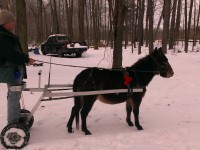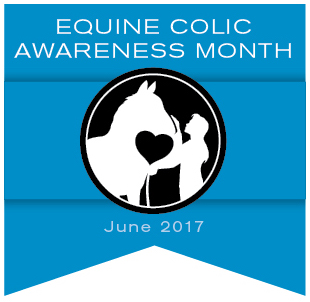
Today, I am an advocate for digestive health in horses because I know how vital it is to performance and overall happiness, in addition to physical wellness. But it wasn’t until the past year or so that I really started to take my horse’s gut health seriously. When My Hard-Keeping Horse Wouldn’t Gain Weight I purchased my young horse off the track, and from the very beginning I had trouble [ Read More ]

Part 4 of 4 in the 2014 Equine Colic Awareness Month Series While colic in horses is often unavoidable, many colics with unknown causes may be related to poor digestive health, and thus could have been prevented. Scientific research and experience both correlate several common management practices to poor gut health as well as increased colic risk. As care givers and decision makers for our horses, the most important thing [ Read More ]

The article was written by Rebecca Barber, our 2014 “spokes-horseperson” for Colic Awareness Month. What does the theme of this year’s colic awareness month mean to me? “Learn. Live. Ride On.,” means that I strive to surround myself with the best. In an industry filled with opinions and unknowns, finding accurate and reliable information is a top priority. This is one of the many reasons why I love being a [ Read More ]

Part 3 of 4 in the Colic Awareness Month Series As we discussed in the first two articles of this series, the first steps in avoiding colic in your horse are: 1) knowing the factors that increase risk for colic and 2) recognizing the early warning signs of poor gut health that could signal increased colic risk. The next critical step in recognizing colic early, or when poor digestive health [ Read More ]

By knowing the signs of Colic and being proactive, Cathy was able to properly respond and care for her dear mule, Clementine. It was last July in the humid heat of Michigan. We noticed our little mule Clementine laying on the ground before she would repeatedly get up, lie back down and roll around. I knew what that meant. I called the vet but she couldn’t come out because she [ Read More ]

Part 2 of 4 in the 2014 Colic Awareness Month Series Last week we discussed four common management practices that contribute to poor gut health in horses and could lead to colic: keeping horses in stalls, limiting access to forage, feeding grain, and training and traveling. Even just one of these factors discussed in Know Your Horse’s Risk for Colic may pose a problem for equine gut health. Diarrhea, loss [ Read More ]

The article was written by Rebecca Barber, our 2014 “spokes-horseperson” for Colic Awareness Month. How often do you hear of, or read about, the unexpected passing of a horse from a bout of colic? Whether it’s a young rider’s three-foot jumper or an upper level event horse, such stories tug at our heartstrings. We mourn for those who have lost while we snuggle with our own creatures, hoping that it [ Read More ]

Part 1 of 4 in the 2014 Colic Awareness Month Series Despite the fact that colic is the number one medical cause of death in horses, it can be easy to assume, “it could never happen to my horse.” Colic is something that happens to other people’s horses, right? In reality, your horse may be at a greater risk for colic than you realize. The first step in preventing colic [ Read More ]









